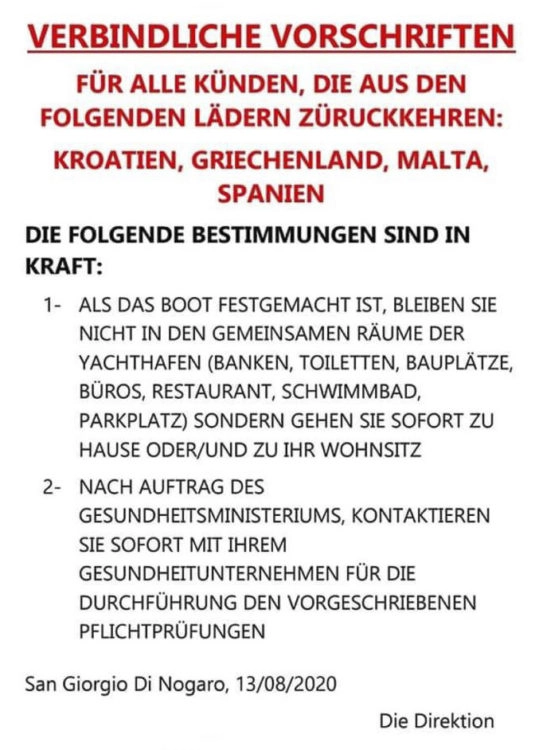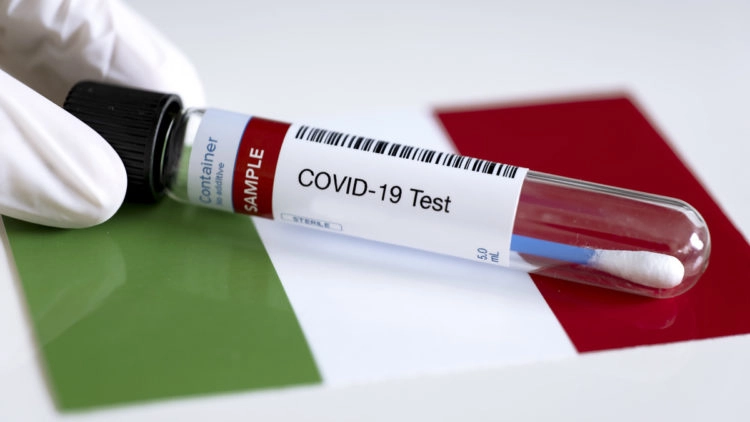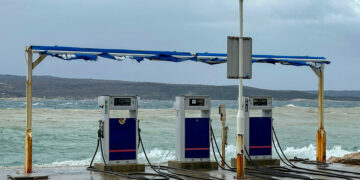Numerous boat and yacht owners from Austria and Germany with moorings in Italy are currently staying in the Croatian Adriatic. Now Italy’s Minister of Health, Roberto Sperenza, has announced that he has ordered that persons who have been in Croatia for the last 14 days must undergo a COVID 19 test when entering Italy. As a result, SeaHelp’s office phones were ringing off the hook with calls from skippers concerned about what would happen when they returned from Croatia to their moorings in Italy.
Regulation leaves room for discretion
Since the regulation, as is so often the case in Italy, offers plenty of room for interpretation, the SeaHelp editorial team contacted the Italian embassy in Berlin. There they were explained with a typical portion of Italian charm, which one does not know exactly how the implementation is planned in detail. In the next days one expects however (hopefully) still more exact information.
Test obligation normally also for transit by car
In the meantime, however, it has become binding, according to the embassy, that anyone who has been in Croatia on one of the last 14 days, whether by boat, yacht or car, must undergo a COVID 19 test when entering Italy. This, it was said, also applies to Austrians and Germans. The implementation of the measures, however, was primarily the responsibility of the local authorities.
Leave the country 36 hours after docking
From this moment on, we leave the segment of factual claims and enter the realm of speculation, or more precisely, the realm of interpretation. As the embassy further stated, the time limit of 36 hours applies to transit through Italy, so in this specific case, normally, owners returning from Croatia to their moorings in Italy would have to leave the country within 36 hours of arrival in Italy.
Cost issue for COVID-19 test unsolved
Ultimately, they would then get around a COVID-19 test, since it was nothing more than transit. However, if they plan to stay in Italy for a longer period of time, such a test must be carried out. The embassy has not yet been able to provide any information about the costs of the COVID-19 test and the subsequent laboratory costs.
No quarantine, even after testing
However, it was confirmed that according to the current situation and information from the Italian embassy, Croatian returnees do not have to be quarantined on their return to Italy and can leave the country unhindered in the direction of their home countries. It was stated literally: “Anyone who arrives in Lignano, for example, by boat or yacht and states that they will leave Italy within the next 36 hours is not actually scheduled for a COVID 19 test. Given the 36-hour time frame, that doesn’t make any sense at all.” At least that’s the message’s interpretation of the new regulation. It goes on to say, “No quarantine is envisaged under any circumstances, with or without testing.”
In the end, at the discretion of the officer intervening.
But one thing should also be clear: theoretically, as the regulation currently requires, you would also have to undergo a test, even if you were to travel on to your home country immediately. Here, one is somewhat dependent on the discretion of the Italian official carrying out the checks.
Car return journey? Avoid Italy
The situation is similar for those who, for example, travel to Croatia via Italy and Slovenia in their own cars. While on the outward journey there are no problems at all to choose the route via Italy, it is better to avoid Italy on the return journey. In the case of possible border controls, the extent and intensity of which has not yet been determined, the basic question is: “Have you been in Croatia within the last 14 days? Whoever answers “yes” to this question truthfully – and that’s how it should be, because if necessary you have to prove it – has to undergo a test or convince the official that he or she will travel to the home country immediately. But even this could not release the person passing through from the obligation to take the test according to the current legal situation, just like the boat owners.
No clear guidelines
In plain language: Anyone who travels from Croatia to Italy, even in transit, must actually undergo a COVID 19 test. After that, however, no quarantine is prescribed for the time being, which means that he can stay in Italy for up to 36 hours or continue his journey immediately. Who pays for the test, the traveller, the traveller’s health insurance company or the Italian state, is not regulated. The bottom line is that it is up to the controlling official to decide whether or not to test at all. As is often the case with Italian regulations, the question of the sense of the test does not arise or is left to the discretion of the controlling authorities. If something changes














